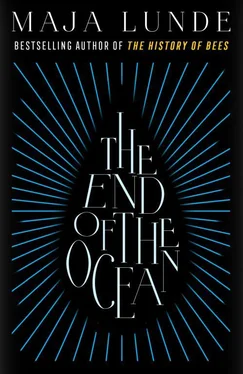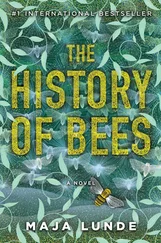Otherwise only the wind was audible, passing through branches, brushing across the blossoms, slipping through the grass on the ground.
A fly buzzed through the air, a rare sight. It had been several days since I had seen a bird, there were fewer of them as well. They hunted the few insects to be found, and starved, like the rest of the world.
But then an earsplitting sound broke the silence. It was the whistle from the management’s barracks, the signal for the second and final break of the day. I noticed immediately how parched my tongue was.
I climbed down with awkward caution. My workmates and I crept down from the trees to the ground. The other women had already begun chatting, as if their cacophonic prattle was flipped on like a switch the split second they knew that they could.
I said nothing, concentrating on getting down without breaking a branch. I managed it. Pure luck. I was infinitely clumsy, had been working out here long enough to know that I would never be really good at the job.
On the ground beside the tree was a beat-up metal water bottle. I grabbed it and drank quickly. The water was lukewarm and tasted of aluminum, the taste made me drink less than I needed.
Two young boys dressed in white from the Trade Commission rapidly distributed the reusable tin boxes containing the second meal of the day. I sat down by myself with my back against the tree trunk and opened mine. The rice was mixed with corn today. I ate quickly. As usual, a bit too salty, and seasoned with artificially manufactured chili pepper and soy. It had been a long time since I had tasted meat. Animal feed required too much arable land. And a lot of the traditional animal feed required pollination. The animals weren’t worth our painstaking handiwork.
The tin box was empty before I was full. I stood up and put it back in the return basket from the Trade Commission. Then I jogged in place. My legs were tired, but nonetheless stiff from standing still in locked positions up there in the trees. My blood tingled; I couldn’t stand still.
But it didn’t help. I took a quick look around me. Nobody from management was paying attention. I quickly lay down on the ground, just to stretch out my back. It was aching after having been bent over in the same position for a long time.
I closed my eyes for a moment, tried to shut out the conversation of the other women of the crew, instead listening to how the chatter rose and fell in volume. This need to talk, all of them at the same time, where did it come from? The other women had started when they were little girls. Hour after hour of group conversations where the subject was always of the lowest common denominator and one could never really go into depth about anything. Perhaps with the exception of when the one being talked about wasn’t there.
Personally I preferred one-on-one conversations. Or my own company, for that matter. At work, often the latter. At home I had Kuan, my husband. Not that we had the longest conversations, either, conversation wasn’t what held us together. Kuan’s references were here and now, he was concrete, didn’t crave knowledge, something more. But in his arms I found peace. And then we had Wei-Wen, our three-year-old. Him we could talk about.
Just as the cacophony had almost sung me to sleep, it suddenly fell silent. Everyone was quiet.
I sat up. The others on the crew were facing the road.
The entourage was walking down the tire ruts and towards us.
They were no more than eight or nine years old. I recognized several of them from Wei-Wen’s school. All of them had been given identical work clothes, the same synthetic beige uniforms that we were wearing, and they walked towards us as quickly as their short legs could carry them. Two adult leaders kept them in line. One in front, one behind. Both of them were equipped with powerful voices that corrected the children without cease, but they did not reprimand them, giving instructions with warmth and compassion, because even though the children had not yet fully taken in where they were headed, the adults knew.
The children walked hand in hand, in mismatched pairs, the tallest with the shortest, the older children taking care of the younger. An uneven gait, disorganized, but the hands held on tight as if they were glued together. Perhaps they had been given strict instructions not to let go.
Their eyes were on us, on the trees. Curious, wrinkling their noses a bit, cocking their heads. As if they were here for the first time, even though all of them had grown up in the district and didn’t know of any kind of nature other than the endless rows of fruit trees, against the shadow of the overgrown forest in the south. A short girl looked at me for a long time, with big, slightly close-set eyes. She blinked a few times, then sniffed loudly. She held a skinny boy by the hand. He yawned loudly and unabashedly, didn’t lift his free hand to his mouth, wasn’t even aware that his face stretched open into a gaping hole. He wasn’t yawning as an expression of boredom; he was too young for that. It was the shortage of food that caused his fatigue. A tall, frail girl held a little boy by the hand. He was breathing heavily through a stuffed-up nose, with his mouth open, missing both front teeth. The tall girl pulled him behind her while she turned her face towards the sun, squinted and wrinkled her nose, but kept her head in the same position, as if to get some color, or perhaps glean strength.
They arrived every spring, the new children. But were they usually so small? Were they younger this time?
No. They were eight. As they always were. Finished with their schooling. Or… well, they learned numbers and some characters, but beyond that school was only a kind of regulated storage system. Storage and preparation for life out here. Exercises in sitting quietly for a long time. Sit still. Completely still, that’s right. And exercises to develop fine motor skills. They wove carpets from the age of three. Their small fingers were ideally suited for work with complex patterns. Just as they were perfect for the work out here.
The children passed us, turned their faces to the front, towards other trees. Then they walked on, towards another field. The boy without teeth stumbled a bit, but the tall girl held his hand tightly, so he didn’t fall. The parents were not here, but they took care of one another.
The children disappeared down along the tire rut, drowned between the trees.
“Where are they going?” a woman from my crew asked.
“I don’t know,” another replied.
“Probably towards forty-nine or fifty,” a third said. “Nobody has started there yet.”
My stomach twisted into a knot. Where they were going, which field they were headed for, made no difference. It was what they were going to do that—
The whistle sounded from the barracks. We climbed up again. My heart pounded, even though I wasn’t out of breath. For the children had not grown smaller. It was Wei-Wen… In five years he would be eight. In just five years. Then it would be his turn. The hardworking hands were worth more out here than anywhere else. The small fingers, already accustomed to weaving carpets, trained in fine motor skills every single day at school, already fine-tuned for this type of work.
Eight-year-olds out here, day in and day out, stiffened small bodies in the trees. Not even an excuse for a childhood, as my peers and I had had. We had gone to school until we were fifteen.
A non-life.
My hands shook as I lifted the hand holding the precious dust. We all had to work to acquire food, it was said, to make the food we would eat ourselves. Everyone had to contribute, even the children. Because who needs an education when the wheat stores are diminishing? When the rations become smaller and smaller with each passing month? When one must go to bed hungry in the evenings?
Читать дальше










